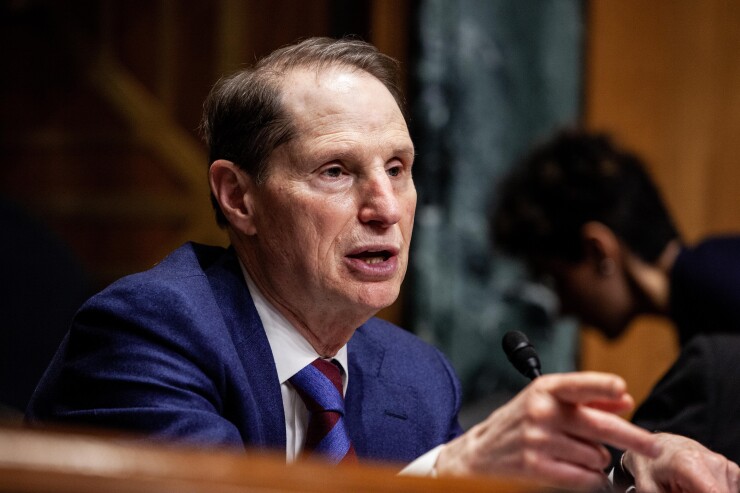WASHINGTON — Public power companies, electric cooperatives and local governments would be authorized to sell Clean Energy Bonds as part of a far-reaching proposal by Senate Democrats that also would give private energy producers new tax incentives to produce clean energy.
The proposed Clean Energy Act for America would become the template for all federal tax preferences for the energy sector, replacing temporary tax credits for wind and solar and repealing existing tax breaks for oil and gas production.
Sen. Ron Wyden of Oregon, the ranking Democrat on the Senate Finance Committee, and 25 other Senate Democrats released the proposed bill on Thursday.
Wyden proposed similar legislation in the last Congress, but this version adds tax provisions to encourage energy storage and carbon capture.

“The federal tax code is woefully inadequate to address today’s energy challenges,” Wyden said in a press statement, describing it as “a hodgepodge of temporary credits, anchored by advantages for big oil.”
Wyden said his legislation offers a way of “reducing carbon emissions or lowering electricity bills for American families.”
The proposed legislation offers a “technology-neutral approach that provides tax incentives and more stability for cleaner energy development across all sectors,” said Sen. Robert Menendez, D-N.J., one of the sponsors.
The
As with the clean electricity and clean fuel credits that are created for private companies, facilities begin qualifying for the credits if they are at least 35% or 25% cleaner, respectively, than the current average for electricity or fuel.
Issuers of the Clean Energy Bonds would have the option of offering the bond as either a tax credit or as a direct-pay bond, where the Treasury Department reimburses the bond issuer at a rate of up to 70% of the interest cost, according to a summary of the bill.
The bonds would be available for clean electricity or fuel facilities that would qualify under the electricity or transportation fuel credits. Clean Energy Bonds would be subject to the same issuance and arbitrage rules as those in effect for tax credit bonds prior to the 2017 tax law.
The American Public Power Association, which represents publicly owned utilities and a number of renewable energy groups, has endorsed the bill.
Among them are the American Council on Renewable Energy (ACORE), the American Biogas Council, American Wind Energy Association, Biomass Power Association, Energy Storage Association, Solar Energy Industries Association, National Hydropower Association and Renewable Fuels Association.
Sue Kelly, president and CEO of the APPA, said the bill proposed by Senate Democrats “ensures that all utilities can benefit from incentives intended to encourage investment in, and energy production from, clean energy resources.”
Since public power companies and electric cooperatives are not taxable, they would not benefit from the tax breaks in the bill. But they would benefit from the cost savings of issuing tax credit or direct-pay bonds.
There are no Republican cosponsors nor is there a companion version being offered as yet in the House.
But there is pressure on Congress to keep tax incentives for wind and solar energy on the books.
In 2015 Congress agreed to phase out the wind production tax credit (PTC) at the end of 2019 and the solar investment tax credit (ITC) by 2022.
Clean Energy Bonds, or CEBs, would be permanent and not be subject to a volume cap unlike previous bond programs.
Clean renewable energy bonds (CREBs) were created by the Energy Policy Act of 2005 and were later modified as “new” CREBs in the Emergency Economic Stabilization Act of 2008, according to the nonpartisan Congressional Research Service.
The original CREBs, which were authorized for issuance through 2009, had a national limit of $1.2 billion of which a maximum of $750 million can be granted to governmental bodies. In addition to governmental bodies, cooperative electric companies and a “clean renewable energy bond lender” were authorized to issue CREBs.
Also in contrast to CREBs and other direct payment bonds, CEB credit payments to issuers would not be subject to federal budget sequestration.





